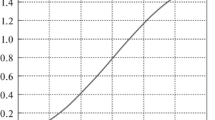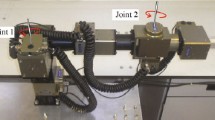Abstract
Learning of stochastically independent decisions is a well developed theory, the main of its part being pattern recognition algorithms. Learning of dependent decisions for discrete time sequences, e.g., for patterns forming a Markov chain and decision support systems, is also developed, but many classes of problems still remain open. Learning sequences of decisions for systems with continuously running time is still under development. In this paper we provide an approach that is based on the idea of iterative learning for repetitive control systems. A new ingredient is that our system learns to find the optimal control that minimizes a quality criterion and attempts to find it even if there are uncertainties in the system parameters. Such approach requires to record and store full sequences of the system state, which can be done using a camera for monitoring of the system states. The theory is illustrated by an example of a laser cladding process.
Access this chapter
Tax calculation will be finalised at checkout
Purchases are for personal use only
Similar content being viewed by others
Notes
- 1.
For simplicity of the exposition we omit an easy generalization to the case when also b contains uncertain parameters.
References
Aschemann, H., Rauh, A.: An integro-differential approach to control-oriented modelling and multivariable norm-optimal iterative learning control for a heated rod. In: 20th International Conference on Methods and Models in Automation and Robotics, pp. 447–452. IEEE (2015)
Astrom, K.J.: Dual control theory. i. Avtomat. i Telemekh. 21(9), 1240–1249 (1960)
Åström, K.J., Wittenmark, B.: Adaptive Control. Courier Corporation, Chelmsford (2013)
Boltyanski, V.G., Poznyak, A.: The Robust Maximum Principle: Theory and Applications. Systems & Control: Foundations & Applications. Springer, Heidelberg (2011)
Cichy, B., Galkowski, K., Rauh, A., Aschemann, H.: Iterative learning control of the electrostatic microbridge actuator. In: 2013 European Control Conference (ECC), pp. 1192–1197. IEEE (2013)
Curtain, R.F., Pritchard, A.J.: Functional analysis in modern applied mathematics, vol. 132. Academic Press, London (1977). IMA
Dabkowski, P., Galkowski, K., Bachelier, O., Rogers, E., Kummert, A., Lam, J.: Strong practical stability and stabilization of uncertain discrete linear repetitive processes. Numer. Linear Algebra Appl. 20(2), 220–233 (2013)
Debnath, L., Mikusiński, P.: Hilbert Spaces with Applications. Academic press, Boston (2005)
Devroye, L., Györfi, L., Lugosi, G.: A Probabilistic Theory of Pattern Recognition. Stochastic Modelling and Applied Probability. Springer, Heidelberg (2013)
Dymkov, M., Rogers, E., Dymkou, S., Galkowski, K.: Constrained optimal control theory for differential linear repetitive processes. SIAM J. Control Optim. 47(1), 396–420 (2008)
Galkowski, K., Paszke, W., Rogers, E., Xu, S., Lam, J., Owens, D.: Stability and control of differential linear repetitive processes using an lmi setting. IEEE Trans. Circ. Syst. II: Analog Digit. Signal Process. 50(9), 662–666 (2003)
Greblicki, W., Pawlak, M.: A classification procedure using the multiple fourier series. Inf. Sci. 26(2), 115–126 (1982)
Hladowski, L., Galkowski, K., Cai, Z., Rogers, E., Freeman, C.T., Lewin, P.L.: A 2d systems approach to iterative learning control with experimental validation. In: Proceedings of the 17th IFAC World Congress, Soeul, Korea, pp. 2832–2837 (2008)
Hladowski, L., Galkowski, K., Cai, Z., Rogers, E., Freeman, C.T., Lewin, P.L.: Experimentally supported 2d systems based iterative learning control law design for error convergence and performance. Control Eng. Pract. 18(4), 339–348 (2010)
Kulikowski, J.L.: Hidden context influence on pattern recognition. J. Telecommun. Inf. Technol. 20, 72–78 (2013)
Kurzyński, M.W.: On the multistage bayes classifier. Pattern Recogn. 21(4), 355–365 (1988)
Libal, U., Hasiewicz, Z.: Wavelet algorithm for hierarchical pattern recognition. In: Steland, A., Rafajłowicz, E., Szajowski, K. (eds.) Stochastic Models, Statistics and Their Applications. SPMS, vol. 122, pp. 391–398. Springer, Heidelberg (2015)
Luenberger, D.G.: Optimization by Vector Space Methods. Wiley, New York (1997)
Mandra, S., Gałkowski, K., Aschemann, H., Rauh, A.: On equivalence classes in iterative learning control. In: Proceedings of 2015 IEEE 9th International Workshop on MultiDimensional (nD) Systems - nDS 2015, Vila Real, Portugal, vol. 1, pp. 45–50 (2015)
Paszke, W., Aschemann, H., Rauh, A., Galkowski, K., Rogers, E.: Two-dimensional systems based iterative learning control for high-speed rack feeder systems. In: Proceedings of 8th International Workshop on Multidimensional Systems (nDS), VDE, pp. 1–6 (2013)
Rafajłowicz, E.: Classifiers sensitive to external context-theory and applications to video sequences. Expert Syst. 29(1), 84–104 (2012)
Rafajłowicz, E., Krzyżak, A.: Pattern recognition with ordered labels. Nonlinear Anal. Theor. Meth. Appl. 71(12), e1437–e1441 (2009)
Roberts, P.: Two-dimensional analysis of an iterative nonlinear optimal control algorithm. IEEE Trans. Circ. Syst. I Fundam. Theor. Appl. 49(6), 872–878 (2002)
Rogers, E., Owens, D.H., Werner, H., Freeman, C.T., Lewin, P.L., Kichhoff, S., Schmidt, C., Lichtenberg, G.: Norm-optimal iterative learning control with application to problems in accelerator-based free electron lasers and rehabilitation robotics. Eur. J. Control 16(5), 497–522 (2010)
Rutkowski, L.: On bayes risk consistent pattern recognition procedures in a quasi-stationary environment. IEEE Trans. Pattern Anal. Mach. Intell. 1, 84–87 (1982)
Rutkowski, L.: Adaptive probabilistic neural networks for pattern classification in time-varying environment. IEEE Trans. Neural Netw. 15(4), 811–827 (2004)
Sastry, S., Bodson, M.: Adaptive Control: Stability, Convergence And Robustness. Courier Corporation, Englewood Cliffs (2011)
Skubalska-Rafajłowicz, E.: Pattern recognition algorithms based on space-filling curves and orthogonal expansions. IEEE Trans. Inf. Theor. 47(5), 1915–1927 (2001)
Styczeń, K., Nitka-Styczeń, K.: Generalized trigonometric approximation of optimal periodic control problems. Int. J. Control 47(2), 445–458 (1988)
Tang, L., Landers, R.G.: Melt pool temperature control for laser metal deposition processes part i: online temperature control. J. Manufact. Sci. Eng. 132(1), 11010 (2010)
Xu, J.X.: A survey on iterative learning control for nonlinear systems. Int. J. Control 84(7), 1275–1294 (2011)
Acknowledgements
This work has been supported by the National Science Center under grant: 2012/07/B/ST7/01216, internal code 350914 of the Wrocław University of Technology.
Author information
Authors and Affiliations
Corresponding author
Editor information
Editors and Affiliations
Rights and permissions
Copyright information
© 2016 Springer International Publishing Switzerland
About this paper
Cite this paper
Rafajłowicz, E., Rafajłowicz, W. (2016). Iterative Learning in Repetitive Optimal Control of Linear Dynamic Processes. In: Rutkowski, L., Korytkowski, M., Scherer, R., Tadeusiewicz, R., Zadeh, L., Zurada, J. (eds) Artificial Intelligence and Soft Computing. ICAISC 2016. Lecture Notes in Computer Science(), vol 9692. Springer, Cham. https://doi.org/10.1007/978-3-319-39378-0_60
Download citation
DOI: https://doi.org/10.1007/978-3-319-39378-0_60
Published:
Publisher Name: Springer, Cham
Print ISBN: 978-3-319-39377-3
Online ISBN: 978-3-319-39378-0
eBook Packages: Computer ScienceComputer Science (R0)




